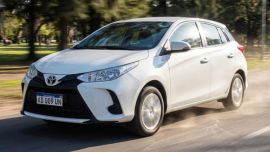The European Commission on Wednesday decided to toughen up a Covid-19 vaccine export vetting scheme it started in February.
Here the five main things to know about the "transparency and authorisation mechanism":
How does it work?
Companies making vaccines in the EU that are also used within the bloc (so far AstraZeneca, BioNTech/Pfizer, Moderna and Johnson & Johnson) have to ask for approval to export doses to non-EU countries.
The request is made to the EU country where the plant is located, but is then subject to scrutiny and an ultimate decision by the European Commission.
Under the latest changes, the commission will weigh the needs of the destination country against those in the EU. They will look at the country's levels of infection, hospital capacity, vaccination rate and vaccine supplies already in hand.
If the destination country is also a base for vaccine production, the commission will look at whether it restricts the flow of vaccines or vaccine ingredients into the European Union "either by law or other means".
EU officials say there is no algorithm or quantifiable threshold in their evaluation, calling the mechanism a framework for "case-by-case" decisions.
What happens to blocked doses?
The commission insists the mechanism is not an "export ban", pointing to the fact that it has already approved 380 export requests and blocked just one: a shipment of 250,000 doses to Australia from Italy.
Any blocked doses do not get handed over to EU countries. The commission says it is up to any affected company to decide what to do with them, but that it cannot try again to send them to the original destination country.
Indirectly, however, companies such as AstraZeneca, which has badly under-delivered to the EU, will be under pressure to direct more supplies to Europe under risk of having deliveries to other customers blocked.
Are there exemptions?
With the latest revisions, the commission has done away with exemptions initially given to 17 non-EU countries, many of them neighbours, including Switzerland, Israel, Norway and Serbia.
This is to prevent any affected companies trying to circumvent a ban by sending doses through channels just outside the bloc, officials said.
However the commission stresses that the mechanism does not apply to Covax, the EU- and World Health Organization-backed initiative to supply vaccines globally, especially to low- and middle-income ones that would otherwise be left with no access.
How does Britain view this?
Although the commission says no country is targeted by the mechanism, it is no secret that the biggest point of friction is with AstraZeneca, based in Britain.
London is afraid the mechanism could choke off supplies from Europe of not only AstraZeneca doses but also ones from BioNTech/Pfizer, frustrating its vaccination rollout, which had been powering far ahead of the EU's.
Prime Minister Boris Johnson has called leaders of the European Commission, France, Germany and the Netherlands to try to head off that threat, while insisting that his government's contract with AstraZeneca gives Britain priority to its doses.
What is the situation in the EU?
The EU's rollout this year started out slowly, underfed by AstraZeneca which it had been contractually counting on for 120 million doses in the first three months.
The company promised instead 30 million, but an EU official told AFP on Wednesday that only 19 million had arrived.
Over the next three months, however, supplies from other drug makers are expected to greatly ramp up.
The commission has contracts to secure up to 2.6 billion doses over this year and next — enough for its 450 million inhabitants plus its commitment to Covax.
According to an AFP tally of official health sources across the EU, the bloc has given jabs to 9.6 percent of its population, or 42.9 million people. At least 18.5 million people have received two doses.
The vaccines being used require two doses to provide full immunity through inoculation, except for the Johnson & Johnson one, which is a single-dose vaccine.
— AFP



















Comments